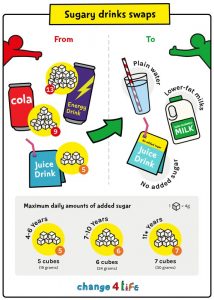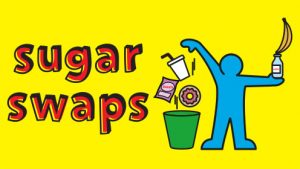Are Children Having Too Much Sugar?
Tooth decay is the number one cause of hospital admissions for general anesthetic in the UK and the main cause of this is a high consumption of sugary food and drinks.
Click to read more of recent findings released by Public Health England (PHE). http://www.smile-onnews.com/news/view/childhood-tooth-extraction-requires-action-in-england
6th April 2018 saw the introduction of the Soft Drinks Industry Levy Regulations 2018 (more commonly known as The Sugar Tax). This may have a positive impact on reducing sugar consumption, however many people are skeptical. Read more about the sugar tax here: https://www.dentalhealth.org/news/details/997
Did you know that most children consume more than half the daily recommended sugar intake before school starts in the morning? More than 11g of sugar is being consumed at breakfast time, almost 3 sugar cubes. The recommended daily maximum is no more than 5 cubes of sugar for 4-6-year old’s and no more than 6 cubes for 7-10-year old per day. By the end of the day children may well have consumed more than 3 times these recommendations. The main sources of sugar at breakfast time include sugary cereals, spreads and drinks. So, if you want to minimize sugar intake, there are plenty of healthier options!
Good snacks include:
- Non-citrus fruits such as apples, pears or peaches.
- Raw vegetables such as carrots and celery, unsweetened yogurt and unflavoured crisps.
Bad snacks include:
- Biscuits and cakes, carbonated drinks, citrus fruit juices and tea and coffee containing sugar.
You should also be careful with hidden sugars which can be in foods you wouldn’t expect, they are added artificially to food for taste.
These include:
- Flavoured crisps, sauces, energy drinks, processed ready meals, bread, yoghurts and many more.
Here are some tips to make healthier swaps simple: 
- Create a ‘fun bottle’ by decorating a plain bottle with permanent markers with your children.
- Download a water tracker app on your phone and let your children mark off the glasses of water they drink every day, this will also help you to make sure your child is hydrated too.
- Water and (plain) milk are the best drinks to have – milk contains calcium which keeps the body strong and is part of a healthy, balanced diet.
- Lots of kids do not like water because it is plain. Try adding some colour to it, you can always add some berries to make the water look more colourful and taste better.
- An app has been created called Be Food Smart and it has been developed to emphasize how much sugar, saturated fat and salt can be found in food and drink that your children consume daily. The free app helps and encourages you to choose a healthier option by scanning the barcode of the product allowing you to compare brands and choose a healthier alternative.
You can visit Change4Life website from where you can receive tips, recipes, competitions and offers to help you maintain your life healthy. https://www.nhs.uk/change4life/food-facts/healthier-snacks-for-kids/lower-sugar-drinks-for-kids-stop-tooth-decay?WT.tsrc=Email&WT.mc_id=0418C4LNewsletterSugaryDrinks#BtHJkPUyeRfkVmXE.97
As well as the dietary changes, ensure your child’s teeth are brushed twice a day with an age appropriate toothpaste and maintain regular dental visits which are free of charge under the NHS for children up to 18 years of age.
If you need any further help or advice give us a call on 020 88884401.

